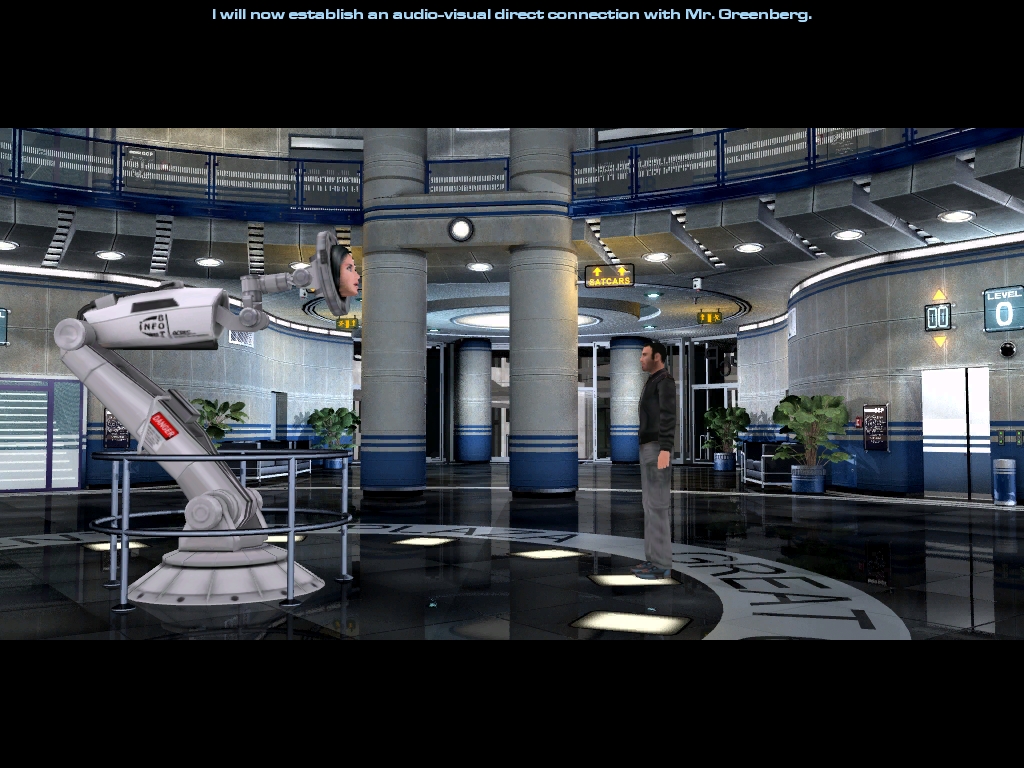
The Moment of Silence
Written by: Rik
Date posted: March 13, 2012
- Genre: Adventure
- Developed by: House of Tales
- Published by: Digital Jesters
- Year released: 2004
- Our score: 4
So here’s some twisted logic: I was drawn to The Moment of Silence by the fact that developer House of Tales also brought us The Mystery of the Druids, a frankly quite poor game dragged into the realms of respectable mediocrity by the considerable amusement value it unintentionally provided, thanks to wonky dialogue, bizarre characters and some of the most ridiculous plot contrivances ever seen in an adventure. Although I didn’t exactly enjoy the experience of playing it, the game definitely had a certain charm, and I did have fun writing the review and documenting its various idiosyncrasies. So, ho-ho, ha-ha, let’s pick another title from the same developer and do the same again, I thought.
If I was being slightly more charitable to myself I might once have considered that The Moment of Silence would turn out to be actually quite good, but to be honest even if that were the case it still would probably have appeared below ‘title has potential for Depeche Mode reference’ in my list of reasons for covering it here. All I can say is: that’ll teach me. The Moment of Silence is not ‘quite good’, nor does it provide a rich vein of potentially amusing observations; facts which became quite obvious in the game’s early stages, with the rest of the experience largely representing a somewhat dull trudge through the adventure game genre’s forgotten wastelands. Still, don’t let that put you off – here’s my review!
In The Moment of Silence, you are Peter Wright, an unassuming media/marketing chap residing in futuristic New York (circa 2044). The game opens as Peter is disturbed by a commotion in his apartment block, which upon investigation turns out to be a police raid on a neighbour’s apartment, culminating in said neighbour being dragged out of his home against his will. As is usually the case with such things, Peter’s curiosity extends beyond observing events through the spy-hole in his front door and perhaps later gossiping about it at work, instead opting to commit himself to a dangerous and potentially life-threatening series of japes in order to get to the bottom of things.
The introduction does have a vaguely cinematic quality to it, and things begin reasonably promisingly, although things soon start to take a turn for the worse, particularly once you leave the apartment block. Sadly, the developer’s vision of a futuristic world is a bit of a Tomorrow’s World embarrassment, with some of the technology on offer having already been surpassed – I suppose the clunky mobile phone (known in future-land as a ‘messenger’) is forgivable given how quickly things in this area have progressed in recent years, but there’s no excuse for the presence of a microwave oven that’s straight from the 1990s.
The New York of the future is a suspiciously quiet place, too, with no traffic to speak of and a handful of static pedestrians dotting the streets. And even making allowances for the cosmopolitan nature of a sophisticated urban metropolis, it seems strange that no-one you come across speaks with an American accent. Except, of course, it’s not a deliberate feature, it’s because this is a low budget European adventure game set in a famous American city, and they’ve just had to do their best, with embarrassing but intermittently-amusing results. The player character manages a borderline-passable Euro-pop fake American accent, and if all the voice work was roughly of that standard, it’d be fair enough, but elsewhere it’s difficult to tell if a character’s even supposed to be American – notable examples include a German child, an English kiosk proprietor and an Australian government agent. In certain areas the dialogue is phrased slightly oddly, too, a result of something being lost in translation.
It all looks okay, though, and the visuals represent a significant improvement over The Mystery of the Druids. Employing a similar approach of polygon character models on 2D backgrounds, everything seems pretty well-integrated, although it has to be said the environments often seem rather static, particularly when you’re outdoors. The general mechanics rely on a straightforward point-and-click interface, which works as you’d expect, although your character does seem to have a bizarre aversion to walking in the direction you ask him to. In fact, he often seems to wander off in the exact opposite direction to the one you’ve indicated, and when you combine that with ever-changing camera angles as your character moves from one scene to the next, impatient and repeated clicking of the mouse can send him wandering around in circles. It’s infuriating at times, although thankfully there doesn’t seem to be any point at which it’s crucial for you to have to move quickly and accurately.
In fact, there’s a general lack of urgency here. The Moment of Silence just sort of plods along, somehow managing to be a chore to get through while at the same time offering little in the way of a challenge. The emphasis mainly seems to be on wandering from location to location, with not a lot to see or do along the way (or even when you get there). And, for a game that offers little in the way of incidental objects to examine, the hotspots for things that are actually of some use are so small that you could miss them even if you knew what you were looking for. Elsewhere, though, you’ll occasionally be scratching your head wondering what to do next, but genuine puzzles are in fairly short supply. In fact, you’ll often encounter a situation which seems perfectly set up for a contrived adventure game puzzle (I need to get into building A but they won’t let me in; person B has something I need to progress) but then lets you off the hook when you discover that, most of the time, you can just ask for what you want, and you’ll get it (see A few things that are a bit ‘off’ (Spoilers!) for specific examples).
The story, such as it is, doesn’t provide much incentive to keep going. Without giving too much away, the early potential of the initial scenes soon fizzles out and the quest to find out exactly what happened to your neighbour and why becomes lost in a humdrum sci-fi tale of generic government oppression and other well-worn themes that have been done before and better. It’s hard to identify much with the main character, either. Even allowing for the general suspension of disbelief that’s usually required for this kind of thing, Peter still seems to have a rather gung-ho attitude, eager to risk his career and then his life for the sake of his missing neighbour. And while I’m sure it’s not deliberate, the unusual eagerness with which Peter goes about this task, combined with some fairly ham-fisted dialogue during scenes with the missing man’s wife, gives the impression of someone attempting to score with a woman in a state of severe emotional distress. That’s obviously not meant to be his motivation, but in the absence of anything else, it easily could be.
I won’t labour the point. The Moment of Silence is a dull, cheap-looking game about which nothing is offensively bad, except for the fact that while you’re playing it you might wish you were doing something else instead. While it looks and sounds like a game from 2004, the adventure itself represents somewhat of a backwards step from the genre’s heyday. Elements of it mirror sections from Blade Runner and Dreamweb yet these older titles remain superior. And something like 2005’s Fahrenheit really does make this kind of thing seem very silly and dated indeed. So, unless you’re a point-and-click completist who’s somehow remained oblivious to the considerable back-catalogue of German titles released during the 00s, this isn’t particularly worth seeking out.

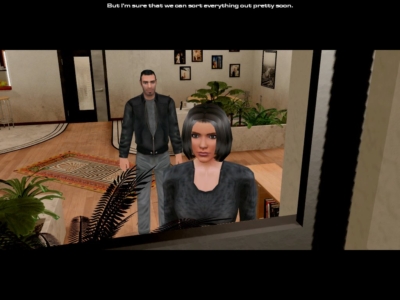
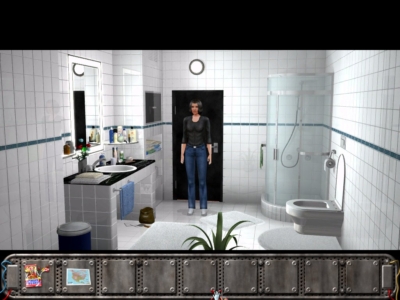
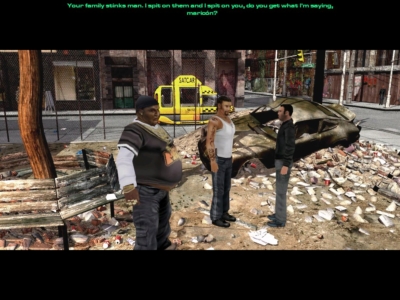
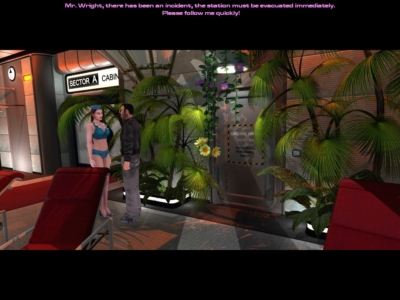

 Posts
Posts